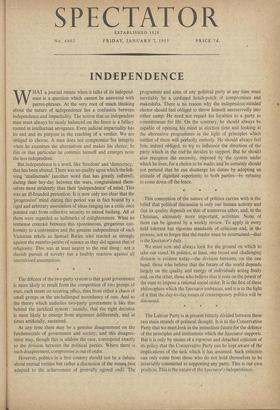INDEPENDENCE
WHAT a journal means when it talks of its independ- ence is a question which cannot be answered with parrot-phrases. At the very root of much thinking about the nature of independence lies a confusion between independence and impartiality. The notion that an independent man must always be nicely balanced on the fence is a fallacy rooted in intellectual arrogance. Even judicial impartiality has its end and its purpose in the reaching of a verdict. We are obliged to choose. A man does not compromise 'his integrity when he examines the alternatives and makes his choice. In this or that particular he commits himself and emerges none the less independent.
But independence is a word, like 'freedom' and 'democracy, that has been abused. There was no quality upon which the left- wing 'intellectuals' (another word that has greatly suffered), during their hey-day between the wars, congratulated them- selves more stridently than their 'independence' of mind. This was an ill-founded pretention. It is now only too clear that the 'progressive' mind during this period was in fact bound by a rigid and arbitrary association of ideas ranging (as a critic once pointed out) from collective security to mixed bathing. All of them were regarded as hallmarks of enlightenment. What an immense contrast between this spontaneous, gregarious con- formity to a convention and the genuine independence of such Victorian rebels as Samuel Butler who reacted as strongly against the mumbo-jumbo of science as they did against that of religiosity. This was at least neftrer to the real thing: not a slavish pursuit of novelty but a healthy reaction against all uncriticised assumptions.
The defence of the two-party system is that good government is more likely to result from the competition of two groups of men, each intent on securing office, than from either a chaos of sniall groups or the unchallenged ascendancy of one. And so the theory which underlies two-party government is like that behind the juridical system : namely, that the right decision is most likely to emerge from argument deliberately, and at times artificially, sustained.
At any time there may be a genuine disagreement on the fundamentals of government aild society, and this disagree- ment may, though this is seldom the case, correspond exactly to the division between the political parties. Where there is such disagreement, compromise is out of order.
However, politics in a free country should not be a debate about eternal verities but rather a discussion of the means best adapted to the achievement of generally agreed ends. The programme and aims of any political party at any time must inevitably be a confused hotch-potch of compromises and makeshifts. There is no reason why the independent-minded elector should feel obliged to throw himself unreservedly into either camp. He need not regard his loyalties to a party as commitments for life. On the contrary, he should always be capable of opening his mind at election time and looking at the alternative programmes in the light of principles which neither of them will perfectly embody. He should always feel free, indeed obliged, to try to influence the direction of the party which in the end he decides to support. But he should also recognise the necessity, imposed by the system under which he lives, for a choice to be'made: and he certainly should not pretend that he can discharge his duties by adopting an attitude of dignified superiority to both parties—by refusing to come down off the fence.
This conception of the nature of politics carries with it the belief that political discussion is only one human activity and that its quality depends on that of numerous 9ther, and, to the Christian, ultimately more important, activities. None of them can be ignored by a weekly review. To apply in every field tolerant but rigorous standards of criticism and, in the process, not to forget that the reader must be entertained—that i s the Spectator's duty.
We must now and always look for the ground on which to take our standAh politics, at least, one broad and challenging division is evident today–'-the division between, on the one hand, those who believe that the future of the world depends largely on the quality and energy of individuals acting freely and, on the other, those who believe that it rests on the power of the state to impose a rational social order. It is the first of these philosophies Which the Spectator embraces, and it is in the light of it that the day-to-day, issues, of contemporary politics will be discussed.
* *
The Labour Party is at present bitterly divided between these two main strands of political thought. It is to the Conservative Party that we must look in the immediate future for the defence of the principles and institutions which the Spectator supports. But it is only by means of a rigorous and detached criticism of its policy that the Conservative Party can be kept aware of the k implications of the task which it has assumed. Such criticism can only come from those who do not hold themselves to be invariably committed to supporting any party. This is our own position. This is the nature of the Spectator's independence.














































 Previous page
Previous page